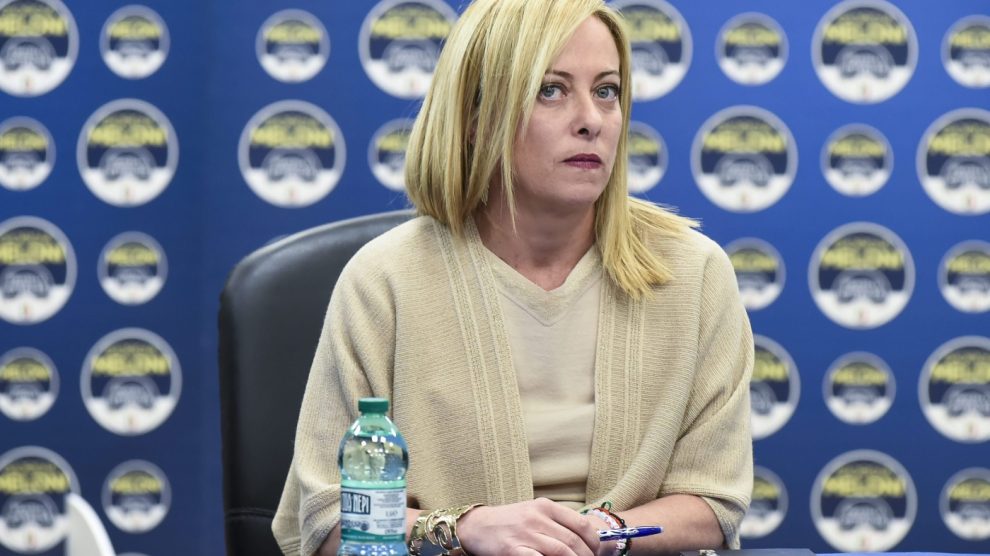A softer Giorgia Meloni? The leader of Brothers of Italy and winner of the September elections seems to be consolidating her party’s conversion into a mainstream conservative force. Communications-wise, she has been campaigning in the name of sobriety, concreteness and trustworthiness, seeking to convince onlookers both in Italy and abroad that she would be a safe pair of hands.
- Now she’s striving to retain that image while aligning with the outgoing government’s policies on key issues and ensuring a smooth handover of power.
Still, her messaging is not exactly EU-aligned. Ms Meloni doesn’t look set to shake off her longstanding affiliation with hyper-nationalistic and uber-conservative forces, along with the traits they share. In fact, some fear she might retain some of her harder edges and favour them over the moderate, reasonable persona she’s been projecting.
- That risk gathered some substance on Sunday when Ms Meloni sent over a video to BoI’s Spanish “cousin”: Vox. And although her mannerism was more institutional – devoid of her usual crowd-rousing manner, she was sitting at a desk, speaking in low tones, an Italian flag in the background – the contents of her speech were far from moderate.
The patriots’ Europe. Ms Meloni pushed the idea of a European Union that’s “more courageous before the great challenges” and “more humble when tackling more local issues, where national policies work best.” She promised to turn her ideas into “concrete policies, as our friends in the Cech Republic, Poland, [Latvia, and soon Sweden].” And ended by saluting “the Europe of patriots.”
- These positions flirt with the concept of the nations’ laws superseding European laws, a potential issue for European unity, pitting the likes of Warsaw and Budapest against Brussels.
An alternative to the left. The next Italian PM said that most EU citizens “don’t recognise themselves in the utopias and ideologies of the left” and “demand that we take responsibility […] We will not be able to do it alone, we will need loyal and reliable fellow travellers, who will stop for once winking at the left and instead help us to organise the alternative to the left.”
Who are her “fellow travellers,” then? That is the question. A good place to start is that very same conference, where former US President Donald Trump and Hungarian PM Viktor Orban also endorsed the Spanish party via pre-recorded videos, while Polish PM Mateusz Moraweicki attended in person.
- The leader of Vox, Santiago Abascal, intends to fight immigration by building impassable walls in the African enclaves of Ceuta and Melilla. Mr Trump congratulated him and praised this plan: “we are all experiencing a singular situation in which we need to defend our borders.”
- The Hungarian PM congratulated Ms Meloni for her victory and hoped Mr Abascal might follow suit at the next elections. “We must defend, before the Brussels bureaucrats, our customs and our sovereignty.”
- “I will not apologise for being a Pole, for being a Christian, for being a person attached to supposedly outdated values such as truth,” said the Polish PM onstage before attacking “Brussels’ bureaucrats” for their supposed attack on the States’ powers “without relying on any treaty” (which is plainly wrong).
The expert’s take. Writing on La Stampa, Professor Giovanni Orsina – a well-known political analyst – noted how Ms Meloni “is trying to split into two distinct entities.” The first is “Euro-realist […] putting herself in the wake of Mario Draghi by saying she is ready to participate fully in the European game by negotiating with all countries, starting with France and Germany.” But the second remains “the champion of Trumpian-Orbaninan conservatism.” Her real challenge, remarked Mr Orsina, will be “balancing these two avatars” to prevent one from dragging down the other.
Meloni’s crossroads: is there any point at this stage in pointing the finger at the “Brussels-appointed puppets” when she’s moving from rallies to the leadership of the country? It will be a matter, quite simply, of being realistic and pursuing national interests. Still, working in that direction without understanding her new role might prove a damaging game.





